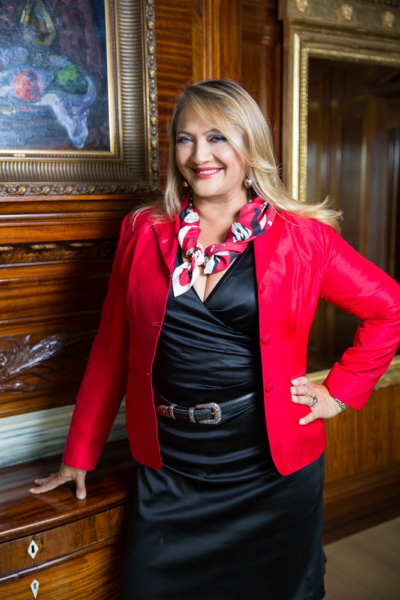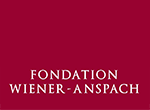
Ayesha Vardag is the President and founder of top family law firm Vardags. In 1990/1991 she was granted a Wiener-Anspach fellowship to study at the Université libre de Bruxelles. In this interview, published in our 2016 Activity Report, she recalls the racy year she spent in Brussels and explains how it radically influenced her professional life.
What was your experience of Brussels during the year of your fellowship?
It was the first time I lived in such a hot, urban area. I was living in the centre, very close to the Grand-Place, and it was all very wild and bohemian and racy. I had tremendous fun there. The ULB was a completely different experience too, because I had been used to the tranquil environment of Cambridge, while the ULB had so many students. It was again very exciting, very busy, and so extraordinarily international. I had a best friend from Cambridge, Georgina Laverack, who was also a Wiener-Anspach fellow and with whom I am still in touch, but I also became very good friends with someone from Venice, and I remember a fascinating German girl… It was an incredibly stimulating environment.
Was it easy to adapt to the new teaching style?
You had to be much more self-disciplined and organized. And of course it was in French. Although I had done French A level and had visited France, I hadn’t had the opportunity to acquire a real facility, so those first few weeks were really tough. I had to acclimatise so that I could follow the lectures. The prospect of having entirely oral exams was also quite dramatic. The examiner can immediately see if you’re unsure about something, and they can probe those areas. It’s a very challenging form of assessment, and it was something I found absolutely terrifying. I had to learn how to deal with my own nerves and my own performance. It was incredibly helpful because throughout the rest of my career I have had to be there on the spot, reacting to challenging situations, to challenging questions.
How would you describe the impact that your experience at the ULB had on your professional life?
That year had the most immense effect on the whole rest of my life. When I left Cambridge I had become somewhat disenchanted with the law. I had actually started doing research work at the BBC with the view to becoming a documentary maker. And then this opportunity came through and it was just too exciting to resist. It repivoted my career back to the law and it gave me a perspective that I could have an international legal career. My objective became doing something that would enable me to get back to Brussels and back to working with European law. I applied to the global law firms, with Linklater’s at the top of my list, and they accepted me. Thanks to a section on nuclear energy in the course in Droit des relations extérieures, I was able to do a stage in Vienna at the International Atomic Energy Agency and a research programme at the Centre for Studies of the Hague Academy of International Law. And all of that had come out of this one quite concentrated section within the course at the ULB.
Why did you change direction into matrimonial law?
It was one of those fortuitous things that life brings you. I had moved, still within commercial law, from being in a global firm to requalifying as a barrister, and I was doing my pupillage in commercial professional negligence law at the Bar. In 2000 my divorce began, and it was a very traumatic event for the whole family. During the course of that I gave up my pupillage at the Bar and I went to stay at home with my little children, doing consultancy work. I worked on my own divorce quite heavily myself, because I was a lawyer and I was trying to save costs. Somewhere in the midst of all that chaos, after my divorce was finished, my divorce lawyer made me an offer to hire me. I had an intense experience for nearly a year and then moved across academic work, because I was having a baby. I did a couple of academic years teaching the family law course at Queen Mary University of London and then set up my own firm, Vardags, after that. When I started doing family law, I realised both how challenging an area of law it is and what a very profound impact it has on the clients. It makes such a difference to their life, not only to their emotional life – because you’re the one trying to give them hope – but also because their financial stability depends on the process, what their home is going to be, how their children are going to be educated, what sort of life they’re going to have in the future. Family law worked for me in a way I had never expected to, because it builds intellectual challenges into very strong personal relationships.
You have been described as “Britain’s top divorce lawyer”. What were the turning points in your career?
I had a lot of very good fortune, from right at the beginning of starting up Vardags. I had a conversation with a mother at the school gates and ended up taking her case. It was a very big case. I didn’t expect to launch my firm with such a bang. And then I had another extraordinary piece of good luck. I was trying to call a friend and I got the wrong person by mistake. I ended up having this rather awkward conversation with someone I didn’t know very well, and in the course of that I said that I had set up a family law firm, and this person said: “Really? A friend of mine would really benefit from your advice!”. And that also became another big High Court case that was about child contact with the father. It was hugely satisfying. Suddenly I had a big run of high-net-worth cases and a busy practice. It was time to hire an assistant!
We then had the Prest case, which established that where corporate assets were concerned, if the spouse had effectively a trust interest in those, then the claiming party could have access to those assets. It meant that the whole thing of just putting stuff in a company and thus getting out of paying for a divorce was broken.
And then there was the Radmacher case…
People say there are two fundamental cases in English family law, because they go most to the heart of it: the White v White case in 2000, which was about the principle of equality between breadwinner and home maker, and the Radmacher case, my case at Vardags, which was about personal autonomy versus state control, about the right of the couple to make their own arrangements. That principle of autonomy permeates the whole of family law now.
Would you say the European perspective acquired in Brussels helped you deal with this case?
It was actually fundamental. The pre-nuptial agreement of my client, a German national married to a French national, didn’t work in England. I started looking at it from a European perspective and thought: everyone else applies these agreements and gives couples this autonomy. The zeitgeist has changed and we need to keep up with it. I feel very strongly that it was the European perspective that I had acquired at the ULB that gave me the confidence to adopt what was a very novel, very challenging position. And we changed the law! It was the biggest case in the history of English family law, with nine judges in the Supreme Court, and it was a career game-changer which brought Vardags to prominence.
After that you had a whole series of record-breaking cases.
We had the case of Michelle Young, in which we got an award that was around 25 million pounds, though the husband was declared bankrupt. And we have just had the Chai v Khoo case. First we won, in the Court of Appeal and the High Court, a very big jurisdiction battle, spanning from Malaysia to England, with assets across the world. The husband was a major international tycoon, the owner of Laura Ashley and Corus Hotels. This was a 43-year marriage with five children, so the wife had made an immense contribution and the wealth had been built up during their time together. If the divorce had been held in Malaysia, she would have got almost nothing. The case has been very important in showing that you have to have a real connection to England in order to get English jurisdiction, but in the cases in which you do, then the English Courts will really support that. Now we have obtained a 64 million pound award for the wife, based on an equal share of the marital assets, one of the biggest ever won in the English courts, hailed as a validation of the contribution of stay-at-home mothers. That payout is currently being appealed by the husband.
Will Brexit have an impact on English family law?
We have to wait and see what will be established, but what I expect is that the reciprocal enforcement arrangements and the arrangements under the Brussels II Regulation will continue. Some will need to be reenacted and some will continue automatically, but the impact of Brexit on English family law will be relatively low. Everyone will just be sensible and make it work.
You have recently moved to Dubai. What prompted you to take this decision?
I am taking this opportunity to build the Middle Eastern profile of Vardags. We always had a lot of Middle Eastern clients, so being here is a very useful platform for raising awareness of our firm. And there is another element. I believe very strongly that if you’re going to have a really sustainable business, you have to let other leaders develop. But as long as you’re always there, you’re sort of smothering everyone. Everyone wants to talk to you, clients don’t see past you. We have a big fleet of absolutely brilliant family lawyers and it was really important to enable them to develop. I’m not building a business just for me, a business that will finish when I retire. I’ve built something that I want to last for many generations. When I moved to Dubai I shifted from being Managing Director to President. Catherine Thomas is now running Vardags on the ground, day to day, as Managing Director, consulting with me and with my husband, who is Director of Strategy. The three of us work like a triumvirate, and it is an incredibly strong management platform. I had been trying to achieve this before I went to Dubai but it just wasn’t possible until I took that physical step. I’m in communication all day with the office, I’m back every month, seeing clients and spending time with the people at the firm, and I’m consulting on all of the challenging cases, but I’m making space for the next leaders.


